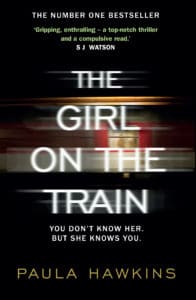Books
‘Girl’ Talk
It has come to this. Not long ago, a book was sent to me by publishers in the hopes of a pre-publication endorsement. The book had the word “girl” in the title, but the letter that accompanied it assured me that “it’s not just another girl book.”
Excuse me?
 For those who have been under rocks, or simply not inclined to notice books, “Girl” has become the talisman for titles in crime fiction. Some look as far back as The Girl with the Dragon Tattoo to explain this trend, but I think the true girl power can be traced to Gone Girl (2012) and The Girl on the Train (2015), both enormous bestsellers. Yet, as others have observed, they share little beyond their genre, crime, and that one word in the title.
For those who have been under rocks, or simply not inclined to notice books, “Girl” has become the talisman for titles in crime fiction. Some look as far back as The Girl with the Dragon Tattoo to explain this trend, but I think the true girl power can be traced to Gone Girl (2012) and The Girl on the Train (2015), both enormous bestsellers. Yet, as others have observed, they share little beyond their genre, crime, and that one word in the title.
I wrote a girl book — back in 2008. The Girl in the Green Raincoat was a slender novella, initially serialized in the New York Times, and I struggled mightily to justify that title, believing that a girl must be under the age of 18. Is there anything more unattractive than women who call themselves girls?
Now there is a parade of girls: Luckiest Girl Alive, The American Girl, The Good Girl. (Emma Cline’s The Girls seems almost daring in its lack of modifier.) These titles have the whiff of a gimmick and genre fiction is forever fighting the notion that it relies on gimmicks.
 But these popular “girls” remind me of an often overlooked fact: women are the primary consumers of fiction, all fiction, even hard-boiled crime fiction. Chick lit is redundant. Why shouldn’t “girls” dominate titles when women readers dominate fiction?
But these popular “girls” remind me of an often overlooked fact: women are the primary consumers of fiction, all fiction, even hard-boiled crime fiction. Chick lit is redundant. Why shouldn’t “girls” dominate titles when women readers dominate fiction?
I understand, from a revenue basis, why publishers worry about reaching male readers. But traditionally masculine pursuits don’t expend a lot of energy trying to attract more female viewers/consumers. In the U.S., for example, the NFL offers some pink gear, but it’s hard to imagine much corporate hand-wringing when the fan bases skews toward those with XY chromosomes. The novel has, from its very beginnings, struggled with its identity as a fluffy entertainment for lesser minds.
So there is something glorious about all these “girls,” although I think their time is passing or has passed. What, if anything, will take the “girls'” place? Given that my novel in progress is called Pink Lady, I am not a disinterested party.



Please note: Moderation is enabled and may delay your comment being posted. There is no need to resubmit your comment. By posting a comment you are agreeing to the website Terms of Use.